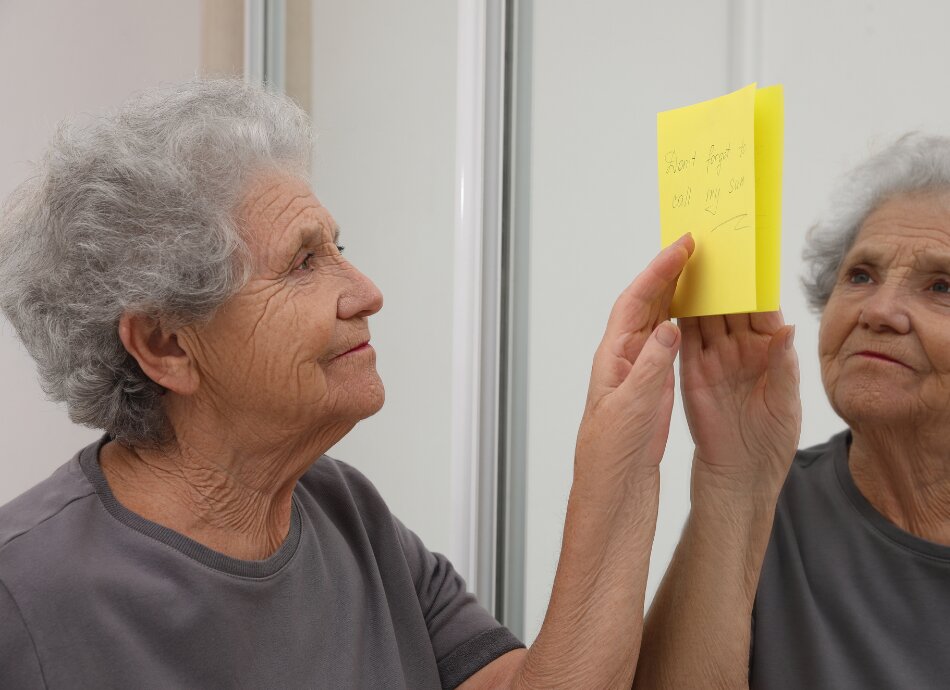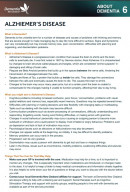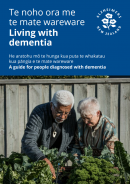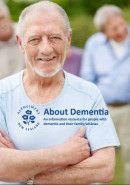Alzheimer's disease
Key points about Alzheimer's disease
- Alzheimer's disease is a brain disease that causes a slow decline in how you remember, understand, communicate and look after yourself.
- It’s the most common form of dementia – about two-thirds of people with dementia have Alzheimer’s disease.
- Growing older is the biggest risk factor.
- Symptoms usually develop slowly and get worse over time.
- There is no cure for Alzheimer's disease, but lifestyle and behavioural changes, and sometimes medicines, can help with symptoms.

Alzheimer’s disease is a type of dementia. Dementia is a general word used to describe symptoms of declining brain function. Symptoms of dementia include problems with memory, thinking, behaviour and being able to do daily tasks. Dementia is not a normal part of ageing.
In Alzheimer’s disease there are physical changes in your cerebral cortex, which is the greyish-pink outer layer of your brain. Abnormal proteins (beta amyloid plaques and tau tangles) build up in your brain. Your brain cells make less of the neurotransmitter acetylcholine, which sends messages around your brain. The abnormal proteins lead to the death of brain cells, and your brain shrinks. Over about 10 years your brain works less and less well and symptoms start to show up.
Alzheimer's is a progressive disease, which means that gradually over time, more parts of your brain are damaged. As this happens, the symptoms get more severe.
It affects about 70,000 people in Aotearoa New Zealand, that’s about 1.4% of the population. It’s getting more common as we live longer.
Dementia affects about 1 in 20 people over the age of 65 and 1 in 5 over the age of 80. About two-thirds of these will have dementia caused by Alzheimer's disease. It’s very common to have both Alzheimer’s disease and the second most common type, vascular dementia. This is called mixed dementia.
We don’t know exactly what causes Alzheimer’s disease. It's probably a combination of things, including age, genes and environmental factors.
Age: This is the greatest risk factor for dementia. However, younger people can also get early-onset dementia, about half of early onset dementia is caused by Alzheimer's disease.
Genetic inheritance: A number of genes have been found that increase the risk of developing the condition. The chance of developing Alzheimer's disease is greater if you have a parent or brother or sister with it. However, very few families have a direct inheritance of the condition from one generation to the next, and where they do, it usually appears early in life.
Environmental factors: People with an increased risk of developing Alzheimer's disease include those who:
- are smokers
- have high blood pressure
- have diabetes
- have high cholesterol levels
- have had a serious head injury
- have Caucasian ethnicity (this is different to vascular dementia, which is more common if you have Māori or Pacific ancestry)
- have Down syndrome or Parkinson’s disease.
Read more about risk factors for dementia.
Video: The genetics of Alzheimer's
(About Alzheimer's, US, 2010)
While there are some common symptoms of Alzheimer's disease, everyone is unique. No two people with Alzheimer's have exactly the same symptoms.
Problems with remembering things that have happened recently are usually the first thing you or the people around you will notice. You’ll usually remember things that happened in the past very well until much later. In the beginning you may:
- have problems finding the right words
- forget the names of people and places
- forget appointments.
As time goes by you may:
- not be able to concentrate or pay attention
- get lost, especially in new places
- lose track of time
- have trouble understanding what is said to you, or what is written down
- have increasing difficulty solving problems and managing complex or new tasks
- show less initiative or withdraw from your usual activities
- experience emotional and personality changes, such as frustration, anxiety or sadness
- become more irritable, suspicious or less emotionally responsive
- get confused.
If you're concerned you or someone close to you may have symptoms of Alzheimer's disease or dementia, it's a good idea to see your healthcare provider. An early diagnosis will:
- help you plan for the future
- allow you to benefit from the treatments available
- help you and your whānau find advice and support.
Your healthcare provider will ask you and the people closest to you about changes you’ve noticed. They will do a cognitive screening test (eg the mini-ACE) to check how well your memory and other brain functions are working.
Your healthcare provider will examine you and will likely order blood tests to rule out other possible causes for your symptoms such as depression, delirium, thyroid problems, side effects of medicines, vitamin deficiencies or a brain tumour.
You may need a CT scan of your head. If the diagnosis is not clear your healthcare provider may refer you to Older Persons Health services.
There is currently no cure for Alzheimer's disease. However, there are treatments to help slow it down.
Lifestyle changes
Lifestyle factors can affect dementia risk and by changing those, you can make the most of your brain. Looking after your brain means:
- getting regular exercise
- avoiding or reducing alcohol and other substance use
- eating a healthy diet
- getting enough sleep
- getting a hearing aid if you have hearing loss
- getting eyesight problems fixed if possible, or having up to date glasses
- keeping up your social activities.
It may also be useful to do brain exercises such as puzzles or use phone apps and practice memory strategies such as lists and reminder notes.
Cognitive stimulation therapy
In some parts of Aotearoa New Zealand, there is the option of cognitive stimulation therapy (CST). This is a structured group treatment developed for people with mild to moderate dementia. There are 14 sessions with a range of activities and discussions aimed at improving cognitive and social functioning. Some rest homes and private hospitals also run similar programmes to CST.
Heart risk factors
Management of heart risk factors may benefit all types of dementia. Generally, what's good for your heart is good for your brain. Read about heart risk assessment.
Medicines
Your healthcare provider will discuss stopping or changing any medicines that can cause or worsen confusion.
There are medicines that can help some people with the symptoms of forgetfulness and confusion.
Acetylcholinesterase inhibitors
These work by increasing the levels of acetylcholine, a neurotransmitter (chemical messenger) in the brain that is involved in memory and judgment. They can help with some of the symptoms or hold back progression of the disease (on average, by 6 to 12 months) if you have mild to moderate Alzheimer’s disease.
Acetylcholinesterase inhibitors include donepezil, rivastigmine and galantamine.
NMDA receptor antagonists
An NMDA receptor antagonist called memantine is also available in Aotearoa New Zealand for moderate to severe Alzheimer’s disease. This prevents too much calcium moving into brain cells. Too much calcium in your brain cells damages them and stops them from getting messages from other brain cells.
Read more about medicines for dementia.
Apps reviewed by Healthify
You may find it useful to look at some dementia apps.
There are some things you can do to plan ahead if you have Alzheimer's disease. These things will help you and your whānau prepare for the future.
Care planning meeting
Plan ahead so that you have more say in your future. Arrange a meeting (or get someone else to do it) with all the people involved in your care. This may include your carer, family/whānau members, or your practice nurse or GP.
Agree on a care plan to support you to stay as well as possible for as long as possible. This might include:
- having a driving assessment
- arranging enduring power of attorney
- writing or updating your will
- developing an advance care plan
- accessing services to help you stay independent for as long as possible
- learning about your condition.
Read more about all of these things you can do to care for yourself with dementia or Alzheimer's.
These personal stories reveal the challenges that come with Alzheimer's disease, not just for you but for your family too.
Video: Living well with dementia – Rita's story
(Alzheimers NZ, 2018)
Video: Together apart
Filmmaker, Suzi Jowsey, bravely follows her own family’s tough journey of caring for their mum who has Alzheimer’s.
(AttitudeLive, NZ, 2015)
Video: A message for patients and their families
This video talks about getting support and things you should consider if you or a family member are diagnosed with Alzheimer's disease.
(About Alzheimer's, US, 2010)
Many people live satisfying lives with Alzheimer’s disease for years. Some people live for up to 20 years after diagnosis, but the usual time is 7 to 10 years.
Because it’s a progressive condition it gets worse over time. Your memory for people and events in your life will likely be lost. You may wander and get lost. As time goes by many people then get less able to walk and move around. As your brain function gets worse you'll become less able to care for yourself. Alzheimer’s Disease can cause problems with swallowing and eating. You may no longer be able to control going to the toilet. You are likely to need extra care in your home or you may need to move into residential care.
- Alzheimers NZ(external link) Phone support 0800 004 001
- Find your local Alzheimer's NZ branch(external link)
- Dementia NZ(external link)
- Carers NZ(external link) 0800 777 797
- More dementia support groups
- Eldernet(external link) Information service on issues affecting older New Zealanders
- Seniorline(external link) Information on how to get help at home, community services and rest homes
Note: Some resources below are from overseas so some details may be different. In New Zealand, phone 111 for emergencies, or if it is not an emergency, phone Healthline 0800 611 116.
Information and support(external link) Alzheimer's NZ
This is our story – a qualitative research report on living with dementia(external link) Alzheimer's NZ
Information for children whose family members have Alzheimer's disease(external link) Alzheimer's Association, US
Brochures
Information in te reo Māori(external link) Alzheimers NZ
Information sheets(external link) Dementia New Zealand
Booklets and factsheets(external link) Alzheimer's New Zealand
Dementia and driving(external link) NZ Transport Agency
Enduring power of attorney [PDF, 566 KB] Office for Senior Citizens, NZ
Younger onset dementia – a practical guide(external link) Alzheimers, Australia
Dementia and support(external link) Alzheimer's New Zealand available in English(external link), te reo Māori(external link), Samoan(external link), Tongan(external link), Cook Islands Māori(external link), Fijian(external link), Kiribati(external link), Niuean(external link), Tokelauan(external link), Tuvaluan(external link)
References
- Alzheimer's disease (external link)Patient Info, UK, 2020
- Cognitive impairment(external link) Auckland Community HealthPathways, 2024 (requires login)
- New Zealand Formulary(external link), 2024
See the page Alzheimer's disease information for healthcare providers.
Brochures

Alzheimer's disease
Dementia New Zealand, 2024

Living with dementia – Te noho ora me te mate wareware
Alzheimers New Zealand, 2023

About dementia – a guide for people with dementia and their whānau
Alzheimer's New Zealand, NZ, 2019
Credits: Healthify editorial team. Healthify is brought to you by Health Navigator Charitable Trust.
Reviewed by: Dr Emma Dunning, Clinical Editor and Advisor
Last reviewed:





